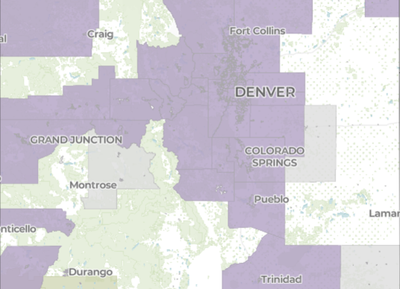Transportation Demand Management (TDM)
What is transportation demand management?
Transportation demand management (or TDM) is the discipline of encouraging and facilitating traveler behavior that makes more efficient use of the transportation network. Ultimately, this means providing people with more choice about how, where, when, and if they travel: giving them more freedom and flexibility in their work hours and location, for instance, or making it more convenient, feasible, and attractive to take transit, ride a bike, or share their trip with other travelers.
Why is transportation demand management important for Colorado?
Population Growth
Colorado's population is projected to increase by over 600,000 residents by 2030. Facilitating more efficient travel choices will be an essential component of the strategy to maintain the reliability of the travel network as it accommodates more travelers.
Public Finance
Colorado cannot afford to “build our way out” of congestion. By making the most of our existing network, we can maximize the impact of tax dollars and reduce future maintenance bills.
Climate Change
While the state has made good progress toward our 2030 GHG targets, additional transportation strategies are needed to close the remaining gap. Emissions-reducing TDM strategies will be needed in addition to zero emission vehicle transitions.
Air Quality
The negative health impacts of vehicle emissions are well documented. TDM can be critical in reducing ozone and criteria pollutants from transportation.
Timing
The pandemic, changing workplace attitudes and policies, labor market shortages and recent transportation policy and investment changes present a critical opportunity.
Landscape of Transportation Demand Management in Colorado
Colorado has a strong tradition of commuter-focused transportation demand management programming, supported by a mixture of regional initiatives - like the Denver Regional Council of Governments' Way to Go Partnership - and programs championed by local governments, transit agencies, and other community and quasi-governmental organizations.
However, many audiences across the state have historically not been part of the conversation, and this has often caused the range of TDM strategies to be constrained by the actors at the table, especially in regard to developing solutions that work for audiences who have not been well-served by traditional TDM efforts - including rural residents, shift workers, caregivers and recreational travelers.
Furthermore, ongoing changes to travel patterns and behaviors in response to the COVID-19 pandemic continue to create fresh challenges for established approaches, and the emergence of new technologies - such as shared micromobility, electric bicycles, and advancements in data analytics - also present invaluable new opportunities for practitioners across the state to tackle varied (and growing) congestion and mobility issues through context-appropriate tools and approaches.
Funding
The Colorado Department of Transportation (CDOT) Office of Innovative Mobility (OIM) has two TDM funding opportunities under the OIM Grant Program. The OIM Grant Program includes TDM Seed Funding Grants and TDM Innovation Grants.

The Colorado Department of Transportation (CDOT) Division of Transit and Rail (DTR) is issuing a Notice of Funding Availability (NOFA) for Federal Transit Administration (FTA) and State transit funds including TDM Seed Funding Grants and TMO Support grants.
Super Call Notice of Funding Availability and GuidanceCongestion mitigation and air quality improvement program (CMAQ) is designed to assist non-attainment and maintenance areas in attaining the national ambient air quality standards by funding transportation projects and programs that will improve air quality.
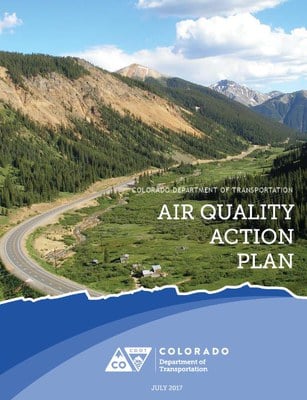
The Revitalizing Main Streets Program began as a part of Colorado’s COVID-19 Recovery Plan, with a $30 million allocation from the state legislature in March 2021. In June 2021, Senate Bill 260 provided $85 million in additional funding for the program over the next 10 years. This program is intended to help communities across the state implement transportation-related projects that improve safety and yield long-term benefits to community main streets. When defining a main street, CDOT is aiming to support areas in or adjacent to community-focused, downtowns where people work, dine and shop. These routes help form a specific region’s identity and act as the major economic hub in many towns and cities across Colorado.
Revitalizing Main Streets Grant ProgramResources
The Colorado Department of Transportation (CDOT) is a multimodal transportation agency which supports a wide variety of alternatives to single occupant vehicle use. Phase 1 of this report details a statewide TDM strategy encompassing core strategies, support strategies emerging technologies TDM for specific travel markets and TDM programs.
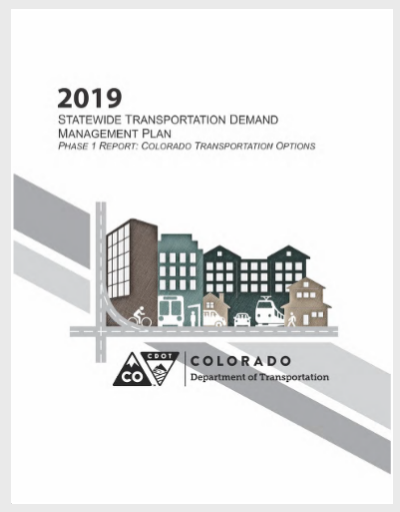
2019 Colorado Transportation Demand Management Plan - an important part of CDOT’s responsibility is to maintain and operate the State Highway System, CDOT is not a highway agency but instead a multimodal transportation agency that supports a wide variety of alternatives to single-occupant vehicle use. This document can help guide you as you begin thinking about how to include TDM strategies or start creating a TDM Plan
As part of the CDOT Procedural Directive 1601 approval process for new interchanges or for modification of an existing interchange, applicants will be required to create a Transportation Demand Management Plan. For questions contact us.
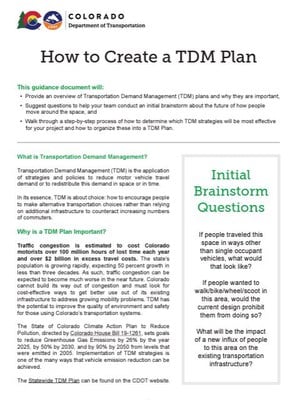
Americans’ dependence on cars and trucks as the dominant means of personal transportation is built on a foundation of dispersed and isolated land use patterns and automobile-centric urban street design, both of which have in turn been created by a complex array of policy and investment decisions. Untangling this complex web of rules and regulations requires a systematic approach to updating policy incentives to align with broadly held public goals—for example, the goal of creating transportation systems that provide equitable; affordable; and sustainable access to jobs, education, healthy food, recreation, and community for all.
The New Transportation Demand Management: An Implementation Guide for City Officials
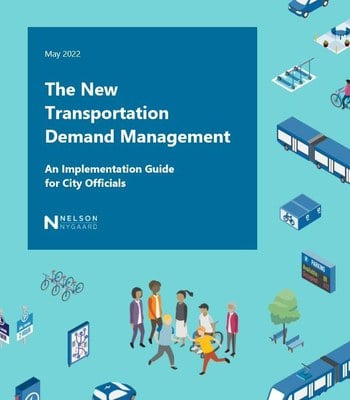
CDOT's Region 1 created a corridor wide plan for Transportation Demand Management. This guide is not only relevant for the East I-70 Corridor, but is an example of how to create corridor wide plans.
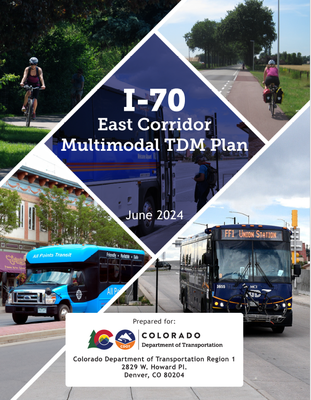
The Colorado Zoning Atlas provides a comprehensive overview of zoning regulations across the state in a user-friendly visual interface. With the goal of democratizing, demystifying, and digitizing zoning codes, the Atlas is an excellent tool for examining the current zoning landscape when considering developing transit-oriented communities.
